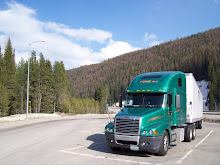I ended up spending a second night in Springfield and earned a 34 hour restart for my 70 hours. I woke up, drove out to the yard to find my trailer, found it, and did a pretrip. The trailer had a flat tire. Now this just pisses me off because tires just don't go flat in such a short amount of time unless they blow out. Never mind that, being a Haz Mat load, the person who brought it in should have been checking the tires (pressure and temperature) every 200-250 miles and logging said tire checks. It's a DOT requirement. Never mind that this trailer is equipped with the nifty TIREMAAX autoinflation system. When a tire is 10psi below optimum pressure, the trailer shines a BRIGHT ASS light in your driver's side mirror.
This was just pure laziness. The fact that this jackass couldn't be bothered to spend 10 minutes post tripping the trailer and turning it over to the shop to get the trailer fixed ended up costing me about 3 hours. See, not only was the tire flat, but part of the rim was bent around the brake drum which meant that the rim had to be CUT off and the brake chamber had to be changed. This could all have been done while I was sleeping last night. But no, this dipshit was too lazy to bother. Cost me three hours to save himself 10 minutes. For those of you who read this, do your post trip inspections properly! And even more importantly, if you find something wrong, GET IT FIXED!! I promise that it will cost the next driver more to take care of it than it would have cost you. Don't be an asshole. Please.
Even worse? It meant this genius was dragging around 41,000 pounds of hazardous material with a flat tire. This is dangerous.
After I finally left the Prime terminal, the rest of the day was just driving. Found a little rest area south of Dallas to park in for the night.
My fleet manager messaged me on the Qualcomm practically begging me to take a load out to Jersey for delivery on Saturday. Problem is, I'm supposed to be at home on Sunday for my wife's birthday. Well, the load is 1540 miles, paying at about $1.42 per mile, plus fuel surcharge. The minimum fuel surcharge this week is $0.25/mile, so I'm looking at $1.67/mile minimum, maybe as much as $1.72/mile. I called my wife and we decided that I should go ahead and do it so that I don't have to struggle to break even this week (this dumb load to Houston is only $1.o7/mile, INCLUDING fuel surcharge!) and actually should be able to turn another tidy profit. That'll probably put me home late next week since it'll take 2-3 loads to get me home from Jersey. Shorter loads out of there pay MUCH better than longer loads.
Wednesday, May 30, 2007
Fun with Haz Mat and The Value of a Good Post Trip Inspection...
Posted by Dr. Zebra at 7:44 PM
Subscribe to:
Post Comments (Atom)

4 comments:
JDSpeed here.
Oh my God!! $1.07 to Houston? Is that typical? I hope not. I guess that depends more so on where the load is coming from. Am I right? What is freight like leaing Houston?
I don't know how typical that is. My only basis for comparison is a load that I took to San Antonio last week that paid $1.28/mile to the truck. I'm repowering one from Mexico headed to New Jersey that's paying $1.42 plus fuel surcharge to the truck, so it should work out ok.
There is no regulation any longer that requires you stop every 200 -300 miles on a haz-mat load. If you do stop though you must do a tire check and log it. But if you don't stop you need not log anything.
§397.17 Tires.
(a) A driver must examine each tire on a motor vehicle at the beginning of each trip and each time the vehicle is parked.
(b) If, as the result of an examination pursuant to paragraph (a) of this section, or otherwise, a tire is found to be flat, leaking, or improperly inflated, the driver must cause the tire to be repaired, replaced, or properly inflated before the vehicle is driven. However, the vehicle may be driven to the nearest safe place to perform the required repair, replacement, or inflation.
(c) If, as the result of an examination pursuant to paragraph (a) of this section, or otherwise, a tire is found to be overheated, the driver shall immediately cause the overheated tire to be removed and placed at a safe distance from the vehicle. The driver shall not operate the vehicle until the cause of the overheating is corrected.
(d) Compliance with the rules in this section does not relieve a driver from the duty to comply with the rules in §§397.5 and §397.7.
I could have SWORN that my state CDL book mentioned that tire checks had to be done every 200 miles or so. I'll look it up when I get home.
Post a Comment